3rd Transnational Partners Meeting in Austria: Exploring best practices in timber construction VET
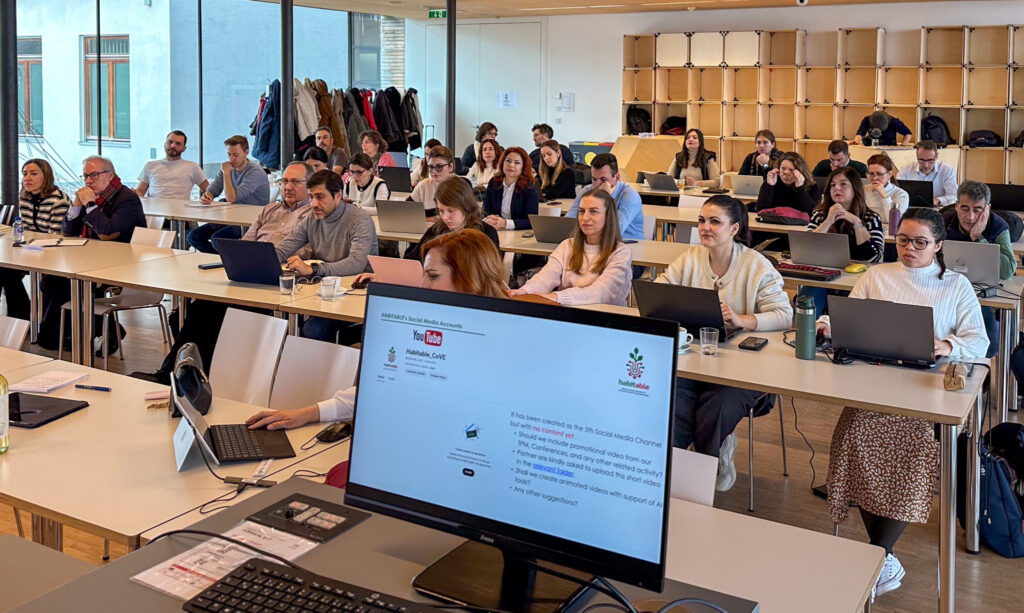
The third Transnational Partners Meeting of the HABITABLE project (Erasmus+ CoVE) was held from 4 to 6 February 2025 in Kuchl, Salzburg, Austria. Hosted by FH Salzburg, the event brought together project partners to assess progress, strengthen collaboration, and gain insight into the Austrian vocational education and training (VET) system, with a special focus on timber construction. A key part of the meeting was dedicated to project development. Partners reviewed the status of all work packages, discussed the progress of activities, and shared updates, questions, and suggestions to ensure the smooth implementation of the project’s next phases. Several workshops and working sessions provided space to address outstanding topics, exchange ideas, and agree on next steps. The meeting also featured multiple study visits that offered participants a comprehensive view of the Austrian dual education system and the excellence of VET provision in the wood and construction sectors. The consortium toured the FH Salzburg Knowledge Campus in Kuchl, including the Higher Technical School (HTL Kuchl), its new wooden facilities, sawmill, CNC machines, and joinery workshops. The group also visited the HTL Hallein, which provides advanced training not only in timber construction, but also in areas such as sculpture, stone and metal work, mechanical engineering, and interior design. To complement the educational visits, the meeting agenda included a company visit to BinderHolz/B-Solutions, where participants learned about industrial innovation in timber construction, and a final visit to WIFI Salzburg, an institution specialising in training and continuing education for skilled professions, including vehicle technology, metalworking, and woodworking. The meeting in Austria provided an enriching exchange of expertise and a clearer understanding of how national systems can contribute to the HABITABLE project’s goal: promoting excellence in green and digital skills for the sustainable transformation of the habitat sector.
HABITABLE Project showcased as a flagship initiative at European wood sector conference in Brussels
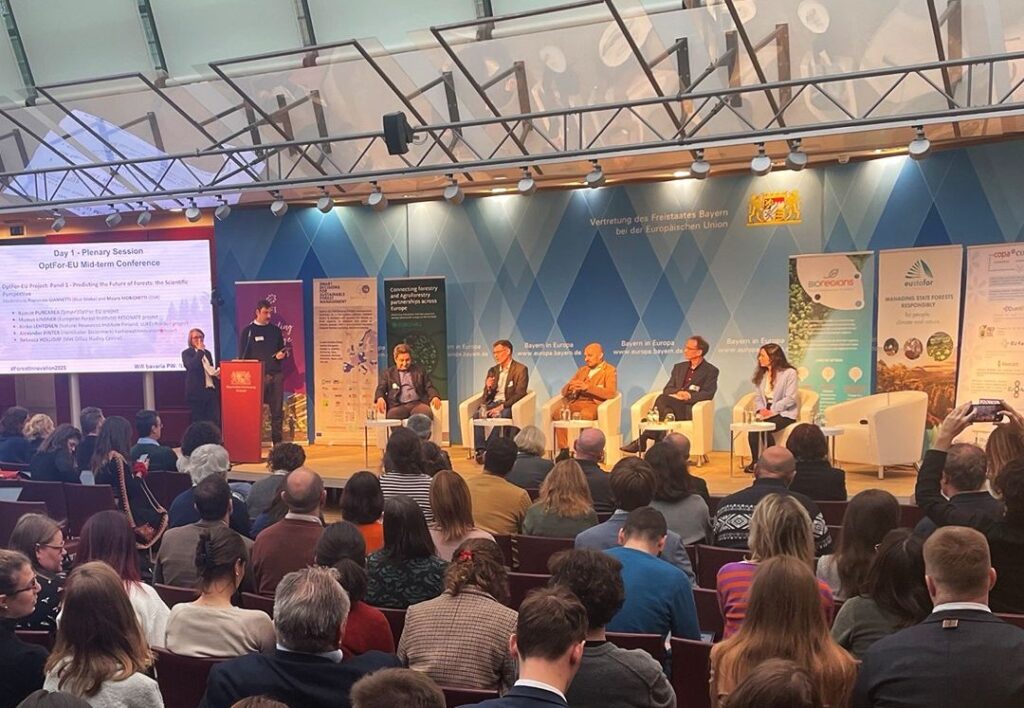
The role of the European wood sector in driving the green and digital transformation of the construction industry was the focus of a high-level conference recently held in Brussels. The event brought together more than 150 participants, including EU policymakers, European Commission officials, industry leaders, and researchers, to discuss how the sector can contribute to Europe’s sustainable future. Among the organisations actively contributing to the conference was Holzcluster Steiermark, a partner of the HABITABLE project and co-organiser of the event. During their intervention, they emphasised the urgent need to upskill and reskill the current workforce to meet the demands of a rapidly evolving construction and habitat sector. As a concrete example of innovation in vocational training, the HABITABLE project was presented as a model initiative, showing how education can be aligned with the sector’s twin green and digital transitions. The conference highlighted the critical importance of equipping workers with new competences and creating training pathways that are relevant to emerging challenges. In this context, HABITABLE’s European network of Centres of Vocational Excellence (CoVEs) is playing a key role in shaping the future of skills in the Habitat sector. By promoting cooperation among VET institutions, companies and regional actors, HABITABLE supports the development of forward-looking training solutions, contributes to sectoral innovation, and fosters a more sustainable, inclusive and future-ready workforce across Europe.
HABITABLE project at the WorldSkills Lyon 2024
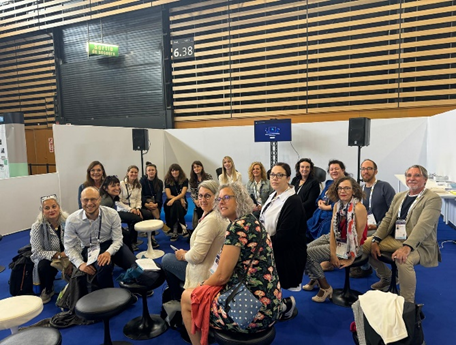
AEICE, the coordinating partner of the HABITABLE project, represented our initiative at the Centres of Vocational Excellence (CoVE) meeting held in Lyon alongside WorldSkills Lyon 2024. This gathering brought together European CoVE stakeholders to exchange best practices in VET and explore synergies across projects. WorldSkills Lyon 2024 took place from 10 to 15 September at Eurexpo Lyon, featuring over 1,400 competitors from nearly 70 countries and regions. In parallel, the WorldSkills Conference convened policymakers, education leaders, and industry experts, with 1,500 participants engaging in discussions on digitalisation, green transition, and social inclusion in VET. Held within this high-profile context, the CoVE meeting enabled AEICE to showcase the HABITABLE project’s progress, including our digital platforms and collaborative tools for the Habitat sector, to exchange insights on governance models and partnerships among European CoVEs, and to identify collaboration opportunities. Attending this great event specialized in VET has helped to disseminate the HABITABLE project at a European level, in addition to learning about other projects, entities, different work methods and processes, which will serve to enrich the entire project.
SMART Skills Intelligence Platform now available on HABITABLE project website

We are excited to announce the launch of the SMART Skills Intelligence Platform (SIP), now accessible on the HABITABLE project website. This innovative online platform is designed to support the transformation of the Habitat sector through the provision of up-to-date, relevant, and structured skills intelligence. Developed as part of the HABITABLE project, the SMART SIP helps align vocational education and training (VET) with the evolving needs of the labour market, especially in the context of the digital and green transitions. By providing insights into jobs, skills, and training opportunities, the platform fosters better career guidance, supports workforce mobility, and helps reduce skills mismatches in the sector. The SMART Skills Intelligence Platform includes three key components: SMART Info An information hub offering guidance on how to use relevant European tools for sectoral skills monitoring. This space provides stakeholders—including VET providers, sectoral organisations, and educational authorities—with access to essential tools and resources to support skills intelligence systems. Sector Map of JOBS and SKILLS An interactive tool that maps occupations in the Habitat sector, linking them with related VET programmes and learning pathways. It offers a dynamic reference framework that helps users understand their current position, explore career options, and identify the skills required to achieve their goals. Training Offer Panel A monitoring dashboard featuring up-to-date information on initial and continuous VET courses and programmes offered within the Habitat skills ecosystems. This panel helps detect gaps in training provision, especially in areas such as digital and green skills, and supports the development of new learning paths aligned with emerging labour market demands. Explore the SMART Skills Intelligence Platform now: https://habitable-cove.eu/smart-sip/
HABITABLE project promotes Green and Digital Skills in Aveiro
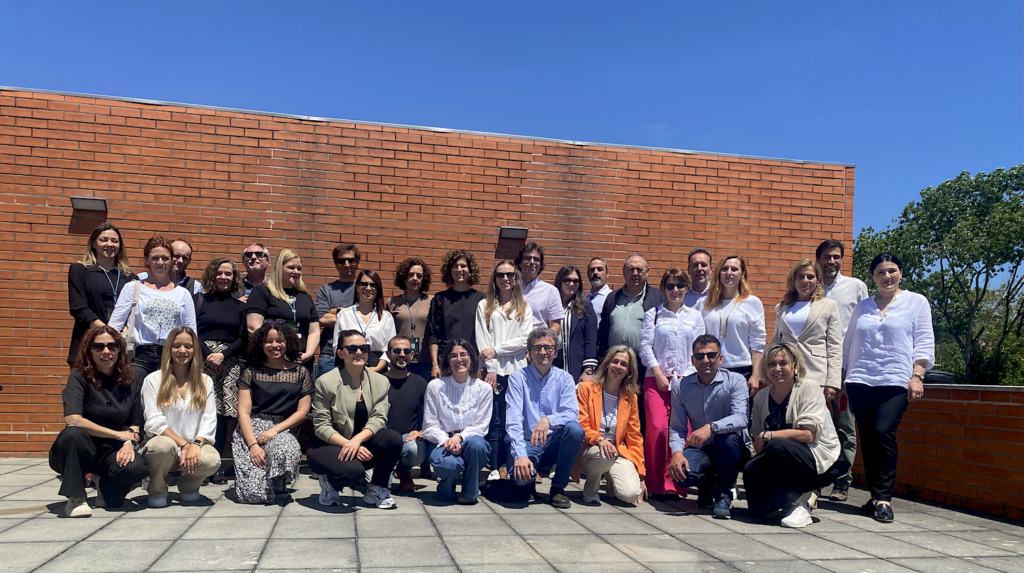
On 23rd and 24th May, the partners of the HABITABLE Project met in Aveiro to celebrate the Multiplier Event in Portugal and the 2nd Transnational Partners Meeting. The project’s 2nd Multiplier Event, entitled ‘Transforming Competences 4 Sustainable Habitat’, took place at the University of Aveiro and was co-organised by the partners Cluster Habitat Sustentável and CTCV. The event, which addressed the importance of green and digital skills in transforming the Habitat value chain, kicked off with an opening session by António Baio Dias (CTCV), followed by a speech entitled ‘Habitable – Alliance of Centres of Excellence in Vocational Training for Sustainable Habitat’ by Carmen Devesa (AEICE), who presented the project’s guidelines, objectives and expected results. The event continued with the intervention of Hélder Gonçalves (LNEG), who spoke about ‘Green Skills for Sustainable Habitat’, followed by a Panel Discussion on the same theme, moderated by Victor Ferreira (Cluster Habitat Sustentável). The panel featured interventions from: Ribeiro Anabela, University of Coimbra Ana Santana, Grestel – Produtos Cerâmicos, S.A. Francisco Paiva, AICCOPN António Neves, University of Aveiro Hugo Rodrigues, Ordem dos Engenheiros After the panel discussion, Sophie Patrício (Centre Region Coordination Commission) presented the Institutional Pact for Valuing the Circular Economy in the Centre Region and Ana Neves (Erasmus+ National Agency) presented the results achieved in ‘2023 – European Year of Skills’. The closing session was led by Victor Ferreira (University of Aveiro), who emphasised the topicality and relevance of reflecting on the issues discussed during this event, highlighting the decisive role that the HABITABLE project seeks to play in this discussion and its possible solutions. On 24th, also at the University of Aveiro, the project partners held their second face-to-face working meeting – ‘2nd Transnational Partners Meeting’, organised by the partner Cluster Habitat Sustentável, where they discussed the results of the tasks completed so far, presented the status of the tasks under development and planned the start of new tasks in the different WPs.
The HABITABLE SKILLS HUB development has already started!
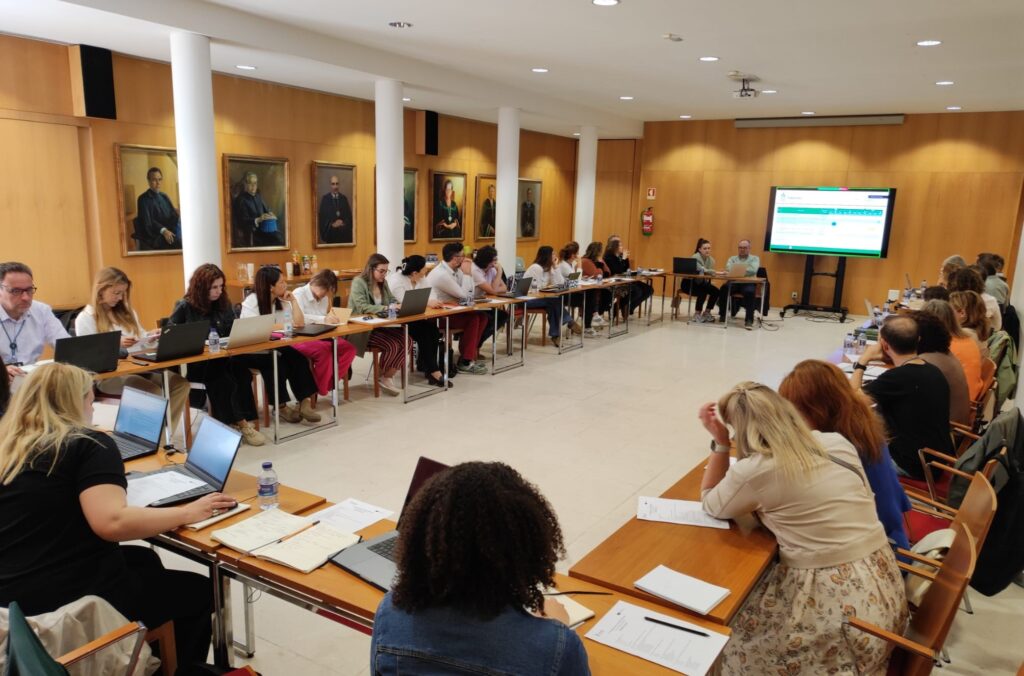
With the objective of building up an online space devoted to skills: from acquisition and recognition to guidance. HABITABLE SKILLS HUB will provide VET teachers, learners, and SMEs employees, with labour market relevant skills, including those necessary for the green and digital transitions. This multifunctional hub will contain: An Online Training Centre, with different MOOCs and courses for trainers, SMEs and VET learners, A Curricula Digital Database, A Micro-credentials Certification Centre, A Career Guidance Space, with a SMART Career Guidance Assistant tool and a Career Guidance Handbook for the Habitat sector. As, this space will integrate smart data and information from previous project developments as the Sector Map of Jobs and Skills, the Training Offer Panel or the WBL for ALL Space, partners used the 2nd TPM – Transnational Partners Meeting in Aveiro, Portugal, to discuss the challenges of these tools.
Co-Creating the Habitat Skills Ecosystem

One goal related to the co-creation of the Habitat Skills Ecosystem is to establish an Habitat Sector Skills Strategy. With this purpose, a working paper on the skills strategy and ecosystem for the Habitat sector was prepared and presented by the General Director of Vocational Education and Training of the Education Ministry in Castilla y León, Mr. Agustín Siguenza, on the HABITABLE Kick-off meeting celebrated in October 2023. This document outlines a strategy for developing professional capacities in the Habitat sector, starting by establishing the desired approach for this assignment and then continuing with the description of the skills ecosystem model. The document was shared with the project partners for feedback, and after incorporating contributions, the final version was presented at 2nd TPM – Transnational Partners Meeting in Aveiro, Portugal, in May 2024. Having completed the first steps of this task, the current efforts are now concentrated on defining and integrating recommendations for implementing the International Network Alliance.
Next Habitable Multiplier Event
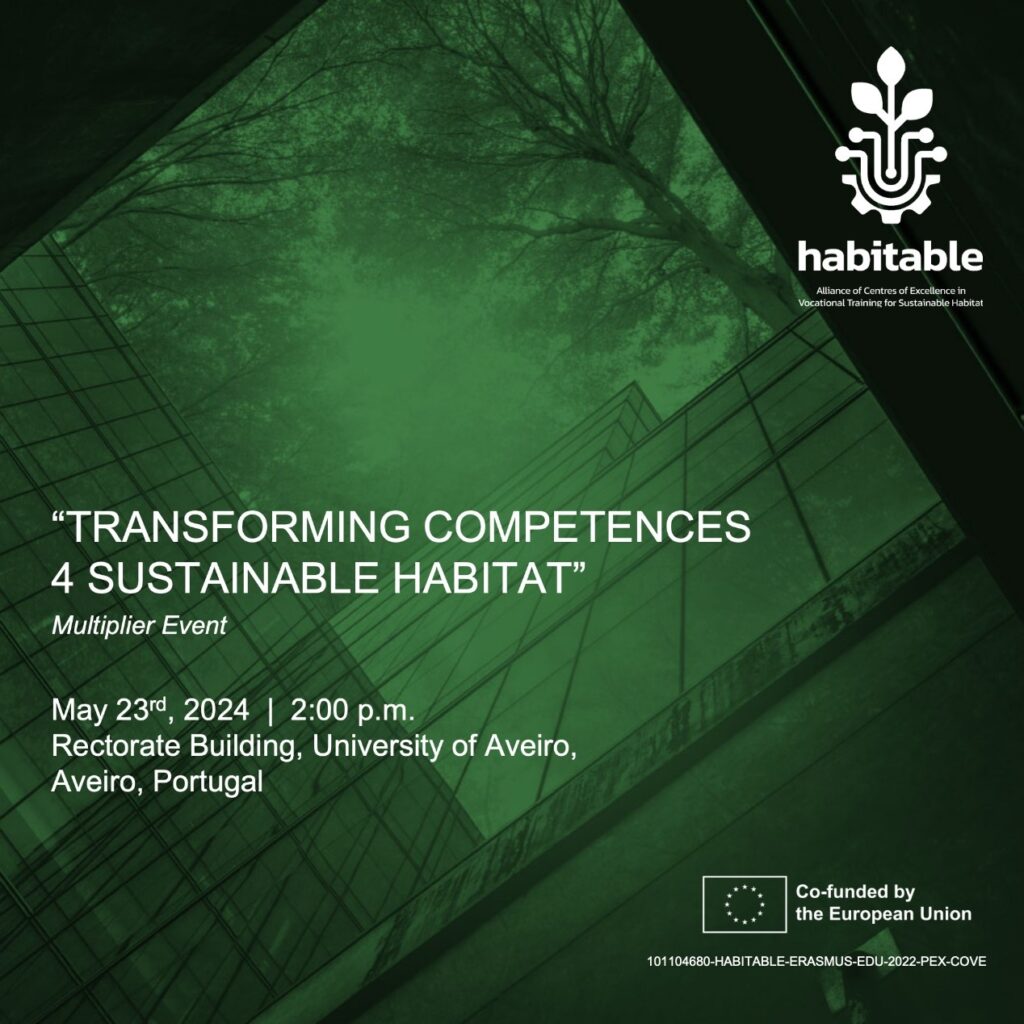
Last March 20th, “the European Commission presented an action plan to tackle labour and skills shortages and proposes to work together with Member States and social partners to address these issues over the coming months and years. The action plan is part of the EU’s strategy to boost its competitiveness and enhance its economic and social resilience. The labor shortage that has been observed for more than a decade in Europe is due to several factors such as demographic changes but also to the search for new skills that allow companies to make their way in the green and digital transition. In this context, the European Commission identified 42 “missing” professions, with some differences between Member States.” (in European Commission press release) From an economic point of view, a vast set of activities are developed in the different sectors of the HABITAT value chain, which integrate a large number of professional occupations, multiple profiles and qualifications, with a diverse range of skills. The sectors of the HABITAT value chain constitute an essential ecosystem to respond to the various challenges that the European Union faces, namely, from climate change to the sustainability of urban and industrial interventions, with human capital being a critical factor for the Green and Digital Transition of this ecosystem. However, organizations belonging to these sectors have difficulty attracting and recruiting professionals, and there is also an inadequacy of the skills of these profiles to respond to the aforementioned challenges. It is therefore essential to attract more people and equip them with the appropriate skills. On May 23, in Aveiro (Portugal) we will bring together experts, professionals from the Habitat sector, business associations, training providers, higher education institutions, teachers/trainers and other stakeholders for an afternoon of reflection and debate on the empowerment the workforce (current and future) for the green and digital transition. Stay tunned, the agenda will be released soon!
HABITABLE partners bridging the gap | Workshop on Training & Needs
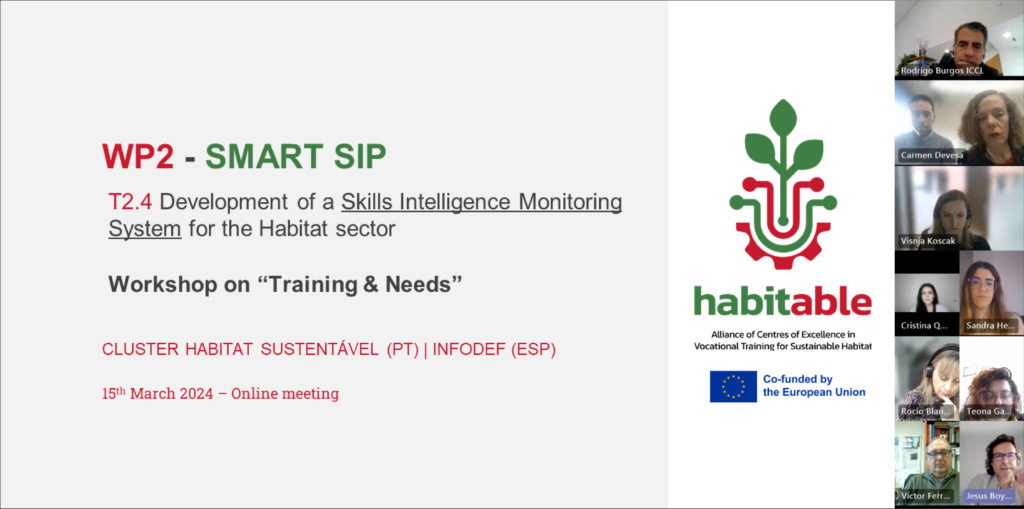
On 15th March, the partners of the HABITABLE project came together to discuss the development of a ground-breaking Skills Intelligence Monitoring System (SIMS) for the Habitat sector in an online workshop. This system, that aims to bridge the gap between training and the needs of the labour market, is being co-designed by the HABITABLE partners and will compile valuable data on training needs, strategic competences, and available training offers within the sector. The SIMS will not only forecast skills gaps but also track current and future trends in jobs and skills within the Habitat sector. Additionally, it will provide valuable input for updating resources like the Sector Map of Jobs and Skills and the Training Offer Panel – TOP HABITAT.
AEICE highlights the key role of Vocational Training in facing the demographic challenge in Castilla y León, thanks to projects such as HABITABLE
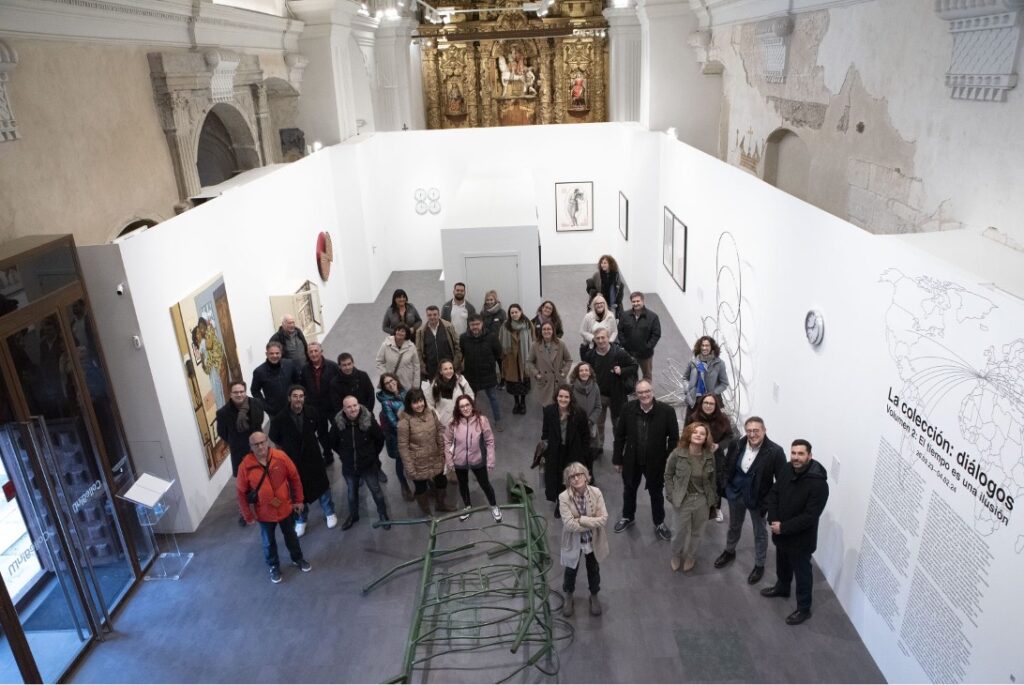
On 2nd and 3rd February 2024, the Forum “Territorios con futuro”, organised by the Efficient Habitat Cluster of Castilla y León (AEICE), took place in Ávila, Spain. During this event, AEICE, underlined the fundamental role played by Vocational Training in promoting entrepreneurship in the rural areas and sustaining the population in activities linked to heritage, digitalisation processes and ecological transformation through the circular economy, among other topics, such as the attraction of talent to sectors like the Habitat. The director of AEICE, Mr. Enrique Cobreros, also pointed out the key role of vocational training in activities linked to the Habitat sector, such as industrialisation and decarbonisation, which require innovative responses that “adjust to the needs of the sector and that constitute in themselves an opportunity for young people to settle in the rural world and create wealth”. The General Director of Vocational Education of the Junta de Castilla y León, Mr. Agustín Sigüenza, during his speech at the forum, stressed the idea mentioned above by AEICE and gave the example of the Erasmus Cove HABITABLE project, a pioneer in Spain and Europe, which aims to align VET with the needs of the Habitat sector, a sector defined by the Sectoral Habitat Plan of Castilla y León. These initiatives together with the HABITABLE project, place the region at the European forefront of Excellence in Vocational Training. The HABITABLE project, that was officially presented to the Ministry of Education of Spain in March 2023, aims to create a skills ecosystem to boost regional development, innovation, and public-private collaboration, ensuring qualified personnel for the Habitat value chain, supported by the European Quality Assurance Framework (EQAVET).